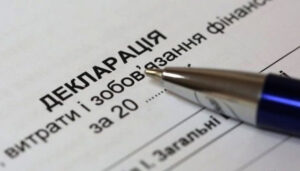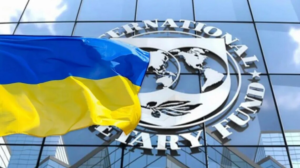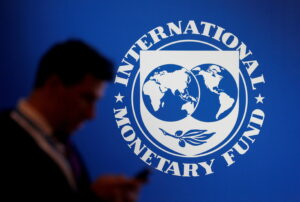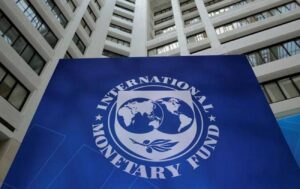
Reinstating the obligation for officials to file asset and income declarations in the coming months is one of the conditions of the $15.6 billion expanded EFF financing program approved by the International Monetary Fund (IMF) for Ukraine on Friday, Fund mission chief Gavin Gray said.
“Under the program, the authorities are committed to a targeted recovery of asset declarations even in the current circumstances. We see this as an important measure…,” he said at a briefing Friday.
Gray specified that the IMF will work with the authorities on this issue in order to resolve it by the first review of the program in June-July this year.
As reported, in February this year, the ambassadors of G7 countries in Ukraine expressed hope that the Verkhovna Rada will soon resume the system of electronic declaration of assets and income of officials, which was suspended during martial law, which “will prevent corruption and strengthen citizens’ trust in government.
Chairman of the National Agency for Combating Corruption (NACC) Oleksandr Novikov said in mid-March that he expects the resumption of declarations in the next two months, but believes that the public part of the register of declarations should remain hidden until the end of the war.
According to him, all public authorities have access to the data of the register of declarations and the data they need to perform their official duties.
Declarations for the year 2022 filed about 6% of declarants. For 2021 – up to 50%, including two deputy heads of the presidential office, the Minister of Education and Science, the Minister of Defense, 28 people’s deputies, five heads of regional military administrations and 163 judges.

The Board of Directors of the International Monetary Fund (IMF) at a meeting on Friday approved Ukraine’s request to open a new four-year extended financing program EFF for a total of SDR11.6 billion ($15.6 billion), an informed source told Interfax-Ukraine news agency.
According to him, the official announcement of the Fund is expected in the very near future on Friday.
According to the agenda published earlier on the Fund’s website, the board also summarized the results of the Monitoring Program for Ukraine with the involvement of the Board of Directors (PMB) opened in December.
As earlier reported, on March 21, the IMF reported reaching a staff-level agreement (SLA) on a new four-year EFF program for Ukraine worth SDR11.6 billion (about $15.6 billion). The fund specified that the final decision of the board of directors is expected in the coming weeks.
On March 24, the Cabinet of Ministers approved the draft Letter of Intent of the IMF and the National Bank of Ukraine and the draft Memorandum on Economic and Financial Policies. At this stage, the documents themselves are traditionally not published.
The program was supposed to be divided into two stages. The first one aims at maintaining stability, lasts 12-18 months and is based on the PMB, while the second phase, with more structural reforms, aims at growth and European integration.
Negotiations on the new EFF program were preceded by the PMB Monitoring Program. With the IMF unprepared to disburse significant funding immediately, Ukraine requested it from the Fund last fall for a period of four months and received approval from the Board of Directors on December 20.
On February 17, an IMF mission concluded in Warsaw, resulting in a statement on the SLA for early termination of the PMB program and the transition to the preparation of a new, expanded program involving financing.

Canada is going to provide a $1.8 billion loan to Ukraine through the International Monetary Fund (IMF) in budget year 2023, CBC TV channel reported with reference to the country’s draft budget.
“Canada will extend a $2.4 billion Canadian dollars ($1.8 billion) loan to Ukraine in the coming budget year. The measure is contained in the latest federal budget, tabled in Parliament on Tuesday by Finance Minister Chrystia Freeland,” the report said.
The loan for Ukraine will be distributed through the IMF. It is intended to cover the budget deficit and pay for social services, including medical services.
According to the TV channel, separately, the Canadian federal budget also announced CAD 84 million (almost $62 million) in additional direct humanitarian aid for Ukraine in the coming fiscal year – money which will be used for mental health services, the removal of mines and other measures. The money will come out of the existing budget at Global Affairs Canada.

An International Monetary Fund (IMF) mission on Wednesday begins discussions with Ukraine’s representatives on a new full-fledged support program involving funding from the Fund.
“The IMF mission led by Gavin Gray begins discussions today with representatives of the Ukrainian authorities on a potential program to be supported by the IMF,” Vahram Stepanian, IMF Resident Representative in Ukraine, said in a statement.
Earlier, Ukrainian Finance Minister Sergei Marchenko announced the work of the IMF mission from March 8 to 15 in Warsaw.
“There we will agree on the terms and conditions, and filling, and volumes, and so on. Now it’s a little early to talk about specific details, because there are a lot of issues of internal discussion of the Fund,” said the head of the Ministry of Finance on March 1.
“I think we will find the necessary solutions so that in April we could have a full-fledged program with the Fund,” said Marchenko.
According to him, so far we are talking about a four-year program, whose task is to make the necessary policy adjustments so that Ukraine, which today spends 50% of its budget on military expenditures and the other 50% financed by the aid of partners, after the war came to a level of “more or less” self-sufficiency.
“The Fund does not yet put forward unbearable conditions that we cannot fulfill. We are talking about program, basic things: ensuring monetary and fiscal stability; reduction of the budget deficit and ensuring an acceptable level of burden on the budget and also good public administration and ensuring best corporate practices. And we are talking about anti-corruption programs, which have traditionally been part of IMF programs,” explained the head of the Ministry of Finance.
Prime Minister Denis Shmygal stated that the amount of the program may amount to $15 billion, of which Ukraine would like to receive $5 billion this year.
As earlier reported, last autumn, when the IMF was not ready to provide substantial financing at once, Ukraine requested a four-month Monitoring Program with Board of Directors (PMB) from the Fund, which the Fund approved on December 20.
An IMF mission concluded in Warsaw on Feb. 17, resulting in a statement that a staff-level agreement (SLA) had been reached to end that program early and move forward with preparations for a new, expanded program involving financing.
Kiev hopes that in the beginning of the second quarter of 2023, the PMB will be replaced by a multiyear extended funding program EFF amounting to about $15 billion, which can cover the gap in covering the $ 38 billion deficit of the state budget-2023, which is now, according to about $5-10 billion.

French Economy Minister Bruno Le Maire on Monday called on the IMF to provide EUR 15 billion in aid to Ukraine and tighten economic sanctions against Russia ahead of the G20 financial meeting this week in India, French Le Figaro writes.
“In addition to the support that Europe provides, in addition to the support that the G7 countries provide, it is important that the IMF mobilizes for Ukraine,” Bruno Le Maire said, marking the “sad anniversary” of the war in Ukraine.
“We are working on the IMF Program for Ukraine, which could amount to about EUR 15 billion over four years,” the French minister said.
According to the publication, citing a source in the IMF, Ukraine will be able to demand financial support, since the Fund believes that the Ukrainian authorities have shown “solid” work within the “Monitoring Program.”
According to the French minister, “economic sanctions are effective” because “they made it possible to almost halve Russia’s oil revenues, they made it possible to completely disrupt Russian production chains, especially in such strategic industries as aviation or automobiles.”
On Friday, February 24, a meeting of finance ministers and heads of central banks of the G20 countries will be held in Bangalore (India).

International Monetary Fund (IMF) staff and Ukraine’s official authorities reached a staff-level agreement (SLA – staff-level agreement) on the first and final review under the Monitoring Program with Board of Directors (PMB).
“This agreement, which is subject to IMF management approval, paves the way for the start of discussions on a full-fledged program supported by the Fund,” the IMF said in a statement Friday evening following the mission.
As reported, Ukraine, amid the IMF’s reluctance to immediately allocate significant funding last fall, requested a four-month PMB Monitoring Program from the Fund, which the Fund approved on December 20. Kiev hopes that this program, which does not involve financing, will be replaced by the Extended Funding Facility (EFF) at the beginning of the second quarter of 2023, which may partially cover the gap in covering the $38 billion deficit in the state budget 2023, which now amounts to about $10 billion.
The IMF mission on the first revision of the program worked in Warsaw on February 13-17. It discussed medium-term macroeconomic indicators, fiscal policy, the structure of financing, financial sector policies, and governance.
“Thanks to the joint efforts of the government and the National Bank of Ukraine, all the quantitative and indicative indicators for the end of December, as well as all five structural benchmarks for the end of January were fulfilled. They included the government’s submission of a package of tax bills, the adoption of measures by the Ministry of Finance on the settlement of overdue debts, the development of a conceptual plan for the social protection system, the creation of the Naftogaz NAB and the agreement of key elements of the banking sector diagnosis,” said Gavin Gray, IMF mission chief.
According to him, the timely provision of significant external support is critical to macroeconomic stability and large-scale disbursements will remain necessary in 2023 and beyond to cover financing needs and ensure stability.
Gray also said that efforts to expand issuance in the domestic bond market should continue to help ensure a stable financing structure and eliminate reliance on monetary financing.
The IMF expects the public sector to play an important role in the recovery, and measures to improve the efficiency and transparency of public finance and governance will be critical.
The Fund also pointed out that the economy contracted by 30% in 2022, less than previously expected, and inflation has begun to slow. At the same time, the short-term outlook has worsened since the PMB approval in December, including due to attacks on critical infrastructure. Nevertheless, the economy is adjusting, and a gradual recovery is expected over the course of the year.
“Fiscal policy in 2023 should take into account higher spending needs. Strengthening tax revenues, including by improving revenue management and restoring tax policy to its prewar state, remains a priority. In addition, Ukraine faces the enormous task of creating fiscal space for war-related recovery and a stronger social safety net, leaving no room for measures that undermine tax revenues,” the Fund noted.
According to the IMF, the NBU has reacted prudently to excess liquidity in the banking system, including by raising reserve requirements and increasing the attractiveness of local currency assets to ensure price and external stability.
“With the outbreak of war, the far-reaching emergency measures imposed under martial law helped maintain financial stability. Now preparations are underway for the gradual lifting of emergency measures in order to bring norms in line with international standards. The NBU is prioritizing updating its financial sector strategy, a key element of which will be an independent assessment of banks’ assets when conditions allow,” the Fund pointed out.
According to his staff, a full-fledged program with the IMF would support the Ukrainian government’s efforts to join the EU. In particular, reform initiatives aimed at improving private sector productivity and competitiveness should be advanced to help lay the groundwork for sustainable post-war growth amid moves toward EU accession.
“The authorities are making progress on reforms to strengthen governance, fight corruption and the rule of law, and lay the foundations for post-war growth, although the reform agenda in these areas remains significant… The private sector is also expected to contribute to recovery efforts,” the release also noted.